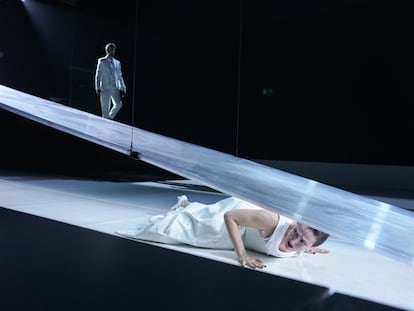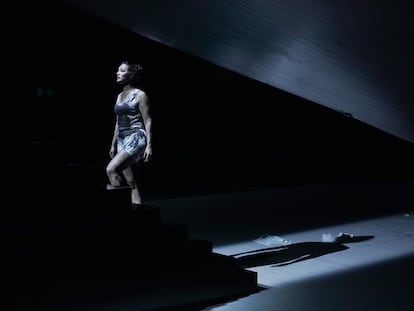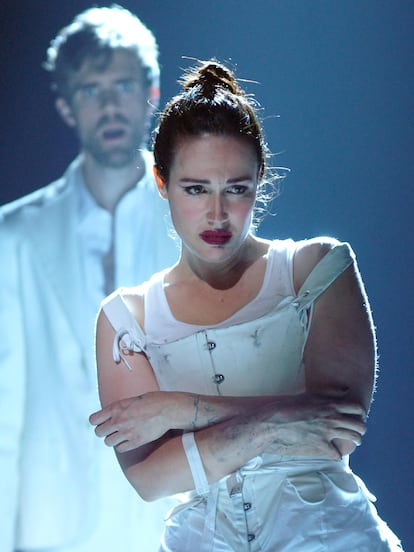The premiere of a new Spanish opera is always a source of attention. In this case, it is a premiere in Madrid, since Don Juan does not exist He saw the light in Perelada last year. Helena Cánovas accumulates sufficient merits to take the thing seriously, in addition to this opera has been the result of the Carmen Mateu Young Artist European Award, received by the Barcelona composer for the creation of this opera.
Helena Cánovas has fallen in love to the obsession of a character, Carmen Díaz de Mendoza, Countess of San Luis, and, above all, of her mystery, her forgetfulness and the absolute absence of traces of a theatrical piece of operatic resonances that, after her premiere, was buried in oblivion. And that is what has become the substance of this proposal that signs, together with the composer already cited, the playwright Alberto Iglesias for the libretto (not to confuse with the famous film musician of the same name).
Cánovas and Iglesias have created a picture in two acts, the first is in the twenties of the last century, with the Countess of San Luis and its creative difficulties to carry out an antimachist allegation embodied in the figure of Don Juan, an inevitably reconstructed or better story. The second act is the present time in which a current creator tries Don Giovannifrom Mozart.
The idea is greatly suggestive. Both in his first half, with the Countess of San Luis and the protagonist, and in the second, with a current creator who lives the reconstruction of that moment with an intense fixation. In both moments, the problem is the men, two indeterminate male characters that overwhelm the two women’s times; in the first half, characterizedly macho; and in the second, micromachista, as one of them proclaims. In both cases, men are the problem, the noise and the affirmation of a principle of reality that always turns into male supremacy.

This inquiry in the problematicity of an artistic creation for women is very interesting. In the section of the Countess of San Luis this problematicity seems almost consubstantial in the twenties of the last century; But, the authors of this creation do not want to put aside those creative difficulties that are aggigant for a woman also in our time.
Undoubtedly, the climax reaches the end of the piece, when the current woman describes a whole list of notable women of those golden years, Zenobia Camprubí, María disturbed, Concha Méndez, Teresa León, María Maeztu, María Rodrigo and enough more. They were, together with the Countess of San Luis, founders of the legendary Lyceum Club Women’s, a model institution that was dismantled after the war of Spain to provide the material basis of the Falangist women’s section. It is perhaps the most emotional moment reading that list of essential women, as if the authors said that the missing Carmen Díaz de Mendoza, Countess of San Luis, could be rebuilt since its radical forgetting by the body of all that golden generation that Franco fulminated.
Helena Cánovas is a young woman, although mature composer. The music that it raises shows an excellent invoice, written for seven instruments, string quartet, saxophone and two percussionists, headlines of the Real Theater Orchestra and admirable by Jhoanna Sierralta, a director out of the Venezuelan orchestras system and shows a very remarkable future. In the section of the vocality, Cánovas moves in multiple directions, from the classical recitative, Mozartian in the first part, to a deployment of resources that are spoken to an interesting vocal virtuosism, to this an effective electronic effective that displays the voice in echoes, resonances and melisms is added. Soprano Montserrat stands out in a first cast.

The staging is in charge of Barbara Lluch, a name that begins to be well known for interesting presences in lyrical productions. With it, a complete female quota is covered in this feminist production, composer, orchestra director and stage director. Lluch’s work is sober and effective, although perhaps he sins an austerity of resources that make this production more abstract than it is.
Together, this Don Juan does not exist It constitutes an admirable inquiry into those female ghosts that have a lot of excess macho pressure and that have blur our cultural history, and, as Cánovas and Iglesias suggest, they are still doing it in much more subtle ways, but not less harmful.
Technical file
Don Juan does not exist. MusicHelena Canovas. LibrettoAlberto Iglesias. Musical directionJhoanna Sierra. Scene addressBarbara Lluch. SceographyBlanca Añón. LightningUrs Schönebaum. Locker roomClara Peluffo. Sound designSixto Camera. Department: Montserrat Seró / Rocío Faus; Josép-Ramon Olivé; Pablo García-López. Soloists of the Titular Orchestra of the Real Theater. Co -production of the Perelada Festival, Great Teatre del Liceu and Maestranza Theater in Seville, with the participation of the Royal Theater and the theaters of the Canal. Dates: May 6 to 11. Theaters of the channel, black room.

